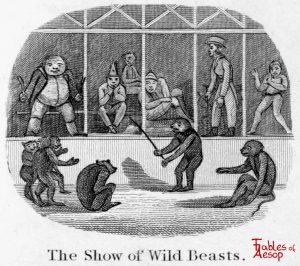Apes talk about what they have seen during their captivity and conclude humans are degraded apes.

Jefferys Taylor
Two apes exhibited for show,
Some time by Mr. Polito;
Thinking their master did not need ’em,
Determined to obtain their freedom;
So waiting till the coast was clear,
One day, when nobody was near,
They issued forth, and hand in hand,
Walk’d for an airing down the Strand;
Nor were they presently espied,
Among so many apes beside;
But unmolested pass’d along
Amid the numerous monkey throng;
Both making sundry observations,
On those they thought were their relations.
At last they form’d the bold design
Some human monkeys to confine,
And show them off (so says the fable)
As English apes, if they were able.
And so it seems, by hook or crook,
Six curious animals they took,
And putting instantly to sea,
They soon arrived in Barbary
Among their friends, and let them know
They’d got some foreign beasts to show.
These friends so throng’d the exhibition,
That many could not gain admission.
Our apes with joy the concourse view’d,
And made for all what room they could;
And then, as is the usual plan,
They took their wands, and thus began.
“Good friends and neighbours all:—you see
After long absence here are we:
We have at last our freedom gain’d,
Though fourteen years we’ve been detain’d,
By apes of an inferior sort
Exhibited, to make them sport;
Of whom we’ve now kidnapp’d a few,
To make in turn some sport for you.
“First you behold the English glutton,
He feeds on beef, pork, veal, and mutton;
But, Oh! such dinners he devours;—
His mouth holds twice as much as our’s;
At once he in his stomach puts
The worth of half a sack of nuts;
But, what is singular indeed,
He never knows how long to feed;
But when no longer hungry will,
While food remains, keep eating still:
He’ll prove the truth of what I’ve said,
If you’ll but stay, and see him fed.
“Here,” said the showman, you behold
An odd young monkey, nine years old;
At least, as near as I can guess
From size and strength, he can’t be less,
Although were you his ways to see,
You’d say he was not turn’d of three;
I think, his name they told me once,
‘Tis, if 1 don’t mistake, a dunce.
Now, from this creature it appears
Boys’ wits increase not with their years;
A striking difference, indeed,
‘Twixt them and us, but let’s proceed.
“The English sloth you there may see;
As usual, sound asleep is he;
You’ll scarce believe me when I say
He sleeps all night, and half the day!
‘Tis ten or twelve before he’ll rise,
And hardly then can ope’ his eyes;
I fear that now we shall not wake him,
Unless one goes inside to shake him;
But while asleep you best behold
All that about him can be told.
“This creature here in sickness pines;
We do not understand his signs,
What ’tis he wants we cannot tell,
We never could when he was well;
He says he’s hungry: but, the fact is,
To say that is his constant practice;
A form of speech he uses then
Peculiar to the race of men;
I can’t explain it, no, not I,
But think ’tis what they call a lie.
“This is an English ape full grown,
The first for your amusement shown;
I fear you will not understand me,
When I pronounce his name, a dandy:
Vast numbers of this race of apes
I’ve seen in town of various shapes;
Their brains are few, as you may guess,
For, all their thoughts they spend on dress;
O! stop, not all, how fast I’m talking;
For, tired of riding, tired of walking,
And wishing much for something new,
They thought they would combine the two,
And tried to speed them on the road,
While they that odd machine bestrode;
You see this thing we’ve brought away;
—Come! show the company, I say.
“This animal, with doubled fist,
Is what they call a pugilist;
A most uncommon creature, Sirs!
Has changed his generic characters,
A beast Linnaeus never saw;
No cutting teeth in either jaw,
Though nature gave him some, no doubt;
But now you see they all are out.
His eyes once grey, as I suppose,
You now perceive are black as sloes;
His nose, once straight, you see is broken;
His features cruelty betoken:
He is, I think, to say the least,
A frightful and disgusting beast.
“Thus, neighbours, we have shown you all
The beasts we’ve taken, great and small;
Full twenty more were on their way,
Whom we could not compel to stay:
Indeed, we got such blows and kicks,
The wonder is we muster’d six.
They’re few indeed, we freely own,
Out of the hundreds we have known;
But yet enough, we feel persuaded,
To show that men are apes degraded.”
